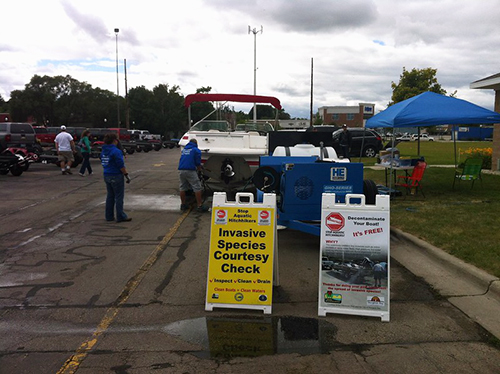National Fishing and Boating Week is almost here. The campaign, led by the Recreational Boating and Fishing Foundation, runs June 6-14 and encourages families to safely enjoy these outdoor pursuits. And, on a state level, June 6-7 marks the Free Fun Weekend organized by the Wisconsin Department of Natural Resources. Perks include free fishing and free state park admission.
Fishing and boating are part of a water-loving lifestyle for many Wisconsinites. And now, as we continue to grapple with containing the spread of the coronavirus, time outdoors—with proper physical distancing from people not in your own household—can be great for one’s mental and physical health.
Wisconsin Sea Grant has a range of resources of interest to anglers and boaters, from our popular Fish ID guide, to information about certified Clean Marinas and ways to avoid the spread of aquatic invasive species (AIS) when using your boat or other watercraft, like a kayak.
We checked in with Molly Bodde, Sea Grant’s AIS coordinator for southeastern Wisconsin, to hear what the battle against AIS will look like in a summer affected by COVID-19. A key program—Clean Boats, Clean Waters, which Sea Grant runs along with the Wisconsin DNR and the UW-Madison Division of Extension, will not have most inspectors out as usual, at least in the early part of the summer.
Inspectors will be available, though, in Racine and Kenosha thanks to an ongoing partnership with the Great Lakes Community Conservation Corps, and Bodde herself may cover some Milwaukee boat landings once university travel policy allows her to. (Bodde is based in the village of Bristol in Kenosha County, but subject to UW-Madison travel rules, since that campus is where Wisconsin Sea Grant is headquartered.)
Bodde and her colleague Tim Campbell, Sea Grant AIS outreach specialist, hope to use signage to fill some of the gaps left by the absence of inspectors. Signs conveying key information will be offered to both public and private boat launches. Some will carry messages tailored to specific segments of outdoor enthuasists, such as waterfowl hunters and fly anglers, who may be entering the water in waders rather than on a watercraft.
Bodde said that, depending on funding levels, “We’ll be able to provide those signs to interested parties”—such as managers of boat launches—”as a way to provide outreach without being able to be physically present at the landings.”

In this photo from 2013, signs encourage boaters to take advantage of a free decontamination station to help prevent the spread of AIS. (Photo: Wisconsin Sea Grant)
Another aspect of AIS prevention efforts this year will be boat decontamination stations in two locations. One is the Green Bay Metro boat launch. From July to September, boat decontamination will be offered for free to the public. Boaters will be able to schedule time slots online so that physical contact between boaters and the person performing the decontamination can be minimized.
“The hope is, if we have the scheduling online, we wouldn’t need to come into direct contact with boaters. And we have to wear PPE anyway while we use the decontamination units, because they involve high-pressure hot water” to remove aquatic plants and animals, said Bodde.
As she summarized, “The focus is going to be reaching those people taking their boat up north for the weekend and then returning,” traveling between Lake Michigan and other bodies of water. Decontamination services at Green Bay Metro are expected to be available Thursday and Friday afternoons and evenings, as well as Sunday evenings, to accommodate these weekend trippers. “We want to reach those people traveling to a different body of water than they would normally be at.”
There are hopes to extend similar services in the Milwaukee area.


